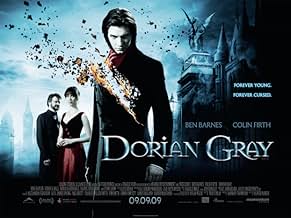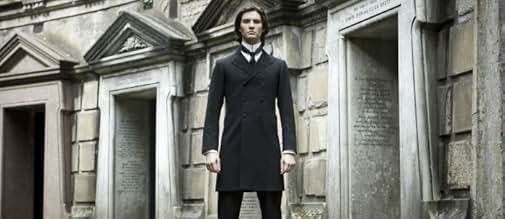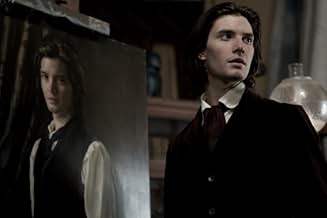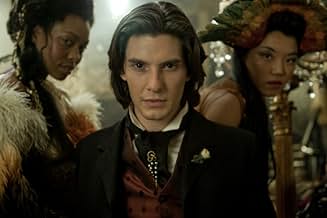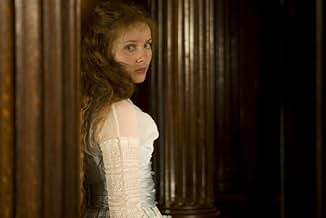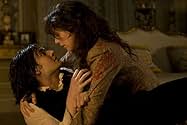IMDb रेटिंग
6.2/10
70 हज़ार
आपकी रेटिंग
अपनी भाषा में प्लॉट जोड़ेंA corrupt young man somehow keeps his youthful beauty eternally, but a special painting gradually reveals his inner ugliness to all.A corrupt young man somehow keeps his youthful beauty eternally, but a special painting gradually reveals his inner ugliness to all.A corrupt young man somehow keeps his youthful beauty eternally, but a special painting gradually reveals his inner ugliness to all.
- पुरस्कार
- कुल 1 नामांकन
Jeff Lipman
- Lord Kelso
- (as Jeffrey Lipman Snr)
फ़ीचर्ड समीक्षाएं
The darkly amoral Oscar Wilde novel "The Picture of Dorian Gray" is one of my favourites and naturally lends itself to both theatrical and cinematic dramatisations with its gripping story-line and sharply-drawn characters. This latest adaptation takes some liberties with the story-line in giving a possible reason for Dorian Gray's headlong dive into hedonism in the form of a bullying father who locked and beat his young self in the attic where he's forced to hide the offending portrait, introduces Henry Wotton's daughter as a love interest and moves the action on in time to the First World War, although the source is so strong, I don't think it needs embellishment.
The Gothic element in the story is frankly maxed out as Doran descends the slippery slope to corruption, in short order corrupting a young actress who falls in love with him, deflowering a young virgin at her coming-out ball (and her mother too!) indulge in a homosexual act with his artist friend, before bottoming out with outright murder. These scenes are lurid in their depiction and justifiable I suppose in demonstrating the levels of depravity Doran Gray has sunk to. Less convincing for me in particular were the back- story of his troubled childhood as it weakened the influence on his character of the Machiavellian all-talk-no-action Henry Wooton character plus I think the action should have been contained within the Late Victorian London era, even allowing for Dorian's ageing.
All the British cast acquit themselves admirable, Ben Barnes very good as the eternally young devil-may-care Dorian, Ben Chaplin, fine as the doomed artist Basil and especially Colin Firth as Wooton, who initially inspires and encourages Dorian's increasingly heartless actions but who realises in the end the monster behind the facade that he as helped foster.
The key climactic scene where Dorian confronts his own self-image is excitingly done and indeed the film plays like a thriller in terms of pace.
In general though I think the director placed too many logs on the fire and sacrificed narrative flow and character motive in so doing, but at least the film was exciting and always trying to move forward, the London exteriors of the 1890 in particular
The Gothic element in the story is frankly maxed out as Doran descends the slippery slope to corruption, in short order corrupting a young actress who falls in love with him, deflowering a young virgin at her coming-out ball (and her mother too!) indulge in a homosexual act with his artist friend, before bottoming out with outright murder. These scenes are lurid in their depiction and justifiable I suppose in demonstrating the levels of depravity Doran Gray has sunk to. Less convincing for me in particular were the back- story of his troubled childhood as it weakened the influence on his character of the Machiavellian all-talk-no-action Henry Wooton character plus I think the action should have been contained within the Late Victorian London era, even allowing for Dorian's ageing.
All the British cast acquit themselves admirable, Ben Barnes very good as the eternally young devil-may-care Dorian, Ben Chaplin, fine as the doomed artist Basil and especially Colin Firth as Wooton, who initially inspires and encourages Dorian's increasingly heartless actions but who realises in the end the monster behind the facade that he as helped foster.
The key climactic scene where Dorian confronts his own self-image is excitingly done and indeed the film plays like a thriller in terms of pace.
In general though I think the director placed too many logs on the fire and sacrificed narrative flow and character motive in so doing, but at least the film was exciting and always trying to move forward, the London exteriors of the 1890 in particular
Based on a book by Oscar Wilde i thought this will be interesting film and i was not disappointed. I never read the book so i don't know how close the book is to the film but i must say the writer has done a great job updating this, with a story that really grip you.
The directer has done great job making it very dark but not too dark you can't see thing. Making feel like you are in back street of London in 1800's. The casting was top notch with newcomer Ben Barnes and an really outstanding performance by Colin Firth. Was really surprised to see Ben Chaplin from the comedy show "Game On". He is not bad drama actor too.
You can really connect with characters in this film which it make it really interesting film to watch and an story that alway make you think. Must see.
The directer has done great job making it very dark but not too dark you can't see thing. Making feel like you are in back street of London in 1800's. The casting was top notch with newcomer Ben Barnes and an really outstanding performance by Colin Firth. Was really surprised to see Ben Chaplin from the comedy show "Game On". He is not bad drama actor too.
You can really connect with characters in this film which it make it really interesting film to watch and an story that alway make you think. Must see.
'Dorian Gray', directed by Oliver Parker, is definitely a more graphic adaptation of the spirit of the book written by Oscar Wilde. Throughout, I wondered how Wilde would react to the film, were he still with us. On one hand, I believe he would have appreciated the touch of horror; I certainly felt it in his writing. He was quoted from another of his books (Lady Windermere's Fan) "In this world there are only two tragedies. One is not getting what one wants, and the other is getting it." In this movie, the latter was certainly true for poor Dorian.
On the other hand, the book 'Picture of Dorian Gray' seemed fairly minimalist in affect (as was Barnes' interpretation of the character) so, would Mr. Wilde be a smidge put off by all the melodrama and overt sexual content? Who knows? He used a lot of symbolism and subtle innuendo in his writing, but the politics of the time could account for some of what he didn't literally spell out, I suppose. After all, he was imprisoned for his lifestyle and beliefs, for a time.
Wilde lived a deep and complicated life. His personality and character were revealed through his writing and oh, what I would have given to be on his list of friends. "A good friend will stab you in the front." -- Oscar Wilde
Alas, the book, in this case, pleased my pitiful imagination more than the movie. While the acting was superb, I had a difficult time reconciling myself with what I felt was an over-reach on the tenor of this great story. You know, the old 'less is more' adage.
My disclaimer to the literary elite: I am simply an appreciator of art, not a professional, so take my opinion with a grain of whatever you prefer.
"I don't say we all ought to misbehave, but we all ought to look as if we could." -- Oscar Wilde
On the other hand, the book 'Picture of Dorian Gray' seemed fairly minimalist in affect (as was Barnes' interpretation of the character) so, would Mr. Wilde be a smidge put off by all the melodrama and overt sexual content? Who knows? He used a lot of symbolism and subtle innuendo in his writing, but the politics of the time could account for some of what he didn't literally spell out, I suppose. After all, he was imprisoned for his lifestyle and beliefs, for a time.
Wilde lived a deep and complicated life. His personality and character were revealed through his writing and oh, what I would have given to be on his list of friends. "A good friend will stab you in the front." -- Oscar Wilde
Alas, the book, in this case, pleased my pitiful imagination more than the movie. While the acting was superb, I had a difficult time reconciling myself with what I felt was an over-reach on the tenor of this great story. You know, the old 'less is more' adage.
My disclaimer to the literary elite: I am simply an appreciator of art, not a professional, so take my opinion with a grain of whatever you prefer.
"I don't say we all ought to misbehave, but we all ought to look as if we could." -- Oscar Wilde
I liked the 1945 film very much, but have always looked forward to a newer film that could dare to delve into the excesses that Wilde could only hint at in his novel, and even the 1945 film had to change a minor few details to make it acceptable for that time.
Now, this version - while it does show more, it has far less. There is none of the wit and wisdom of the characters in the novel or the delicate beauty of Dorian, and the ending is completely changed for no good reason.
I still have to wait for the definitive film version that can (literally) flesh out the characters while still keeping the novel intact. Too much to ask?
Now, this version - while it does show more, it has far less. There is none of the wit and wisdom of the characters in the novel or the delicate beauty of Dorian, and the ending is completely changed for no good reason.
I still have to wait for the definitive film version that can (literally) flesh out the characters while still keeping the novel intact. Too much to ask?
Very good adaption with a nicely chosen cast with some fresh and familiar faces. Thought provoking about pleasure vs happiness like the themes of the namesake book it's based on. The main character's looks is important to the film and the actor delivers his change from innocence to experience to corruption pretty well.
A bit too long in the last arc. Not entirely sure about the final scene or it's contribution to the film-so the man responsible for corrupting Dorian revenges on him for bedding his daughter. Does he do any self reflection at all for his own suggestions and encouragement that led Dorian down this path? It seems to me like the film is missing this angle of development. This is an example of a missing layer of thematic complexity that prevents me from giving a higher score.
I don't recall the book that much but there might be a few innovations in this film such as the same sex scenes (since the author Oscar Wilde I believe was homosexual) and the motivation of Dorian to change and to compel him to his final act.
A bit too long in the last arc. Not entirely sure about the final scene or it's contribution to the film-so the man responsible for corrupting Dorian revenges on him for bedding his daughter. Does he do any self reflection at all for his own suggestions and encouragement that led Dorian down this path? It seems to me like the film is missing this angle of development. This is an example of a missing layer of thematic complexity that prevents me from giving a higher score.
I don't recall the book that much but there might be a few innovations in this film such as the same sex scenes (since the author Oscar Wilde I believe was homosexual) and the motivation of Dorian to change and to compel him to his final act.
क्या आपको पता है
- ट्रिवियाThe original Dorian Gray has blond curly hair and blue eyes.
- गूफ़When Dorian is fighting Jim in the train station tunnel, the sleepers and spikes are visible. The spikes seen were not in use in 1890 when the novel was written, nor the era when the film is set.
- भाव
Lord Henry Wotton: There's no shame in pleasure. Man just wants to be happy. But society wants him to be good. And when he's good, he's rarely happy. But when he's happy, he's always good.
- क्रेज़ी क्रेडिटAt the start of the closing credits, they fade in and out, alternating with images of the Portrait peeking through, as though it is trying to assert itself.
- इसके अलावा अन्य वर्जनDuring post-production, the film was tailored for a '15' certificate in the UK. According to the BBFC, the filmmaker cuts were as follows:
- A scene in which a tea party is inter-cut with shots showing Dorian's sadomasochistic excesses was toned down to remove or reduce the more explicit moments (explicit sight of a fingernail being pulled off, explicit sight of a chest being cut with a razor in a sexual context, explicit sight of blood being sucked from a woman's breasts and sight of a restrained man being beaten).
- Additionally, a murder scene was toned down to remove the sense of dwelling on the infliction of pain and injury (reduction in the number of stabbings, removal of a blood spurt from man's neck, reduction in sight of victim choking on his blood).
- कनेक्शनFeatured in Lost in Adaptation: The Picture of Dorian Gray 2009 (2020)
टॉप पसंद
रेटिंग देने के लिए साइन-इन करें और वैयक्तिकृत सुझावों के लिए वॉचलिस्ट करें
विवरण
- रिलीज़ की तारीख़
- कंट्री ऑफ़ ओरिजिन
- आधिकारिक साइट
- भाषा
- इस रूप में भी जाना जाता है
- El retrato de Dorian Gray
- फ़िल्माने की जगहें
- उत्पादन कंपनियां
- IMDbPro पर और कंपनी क्रेडिट देखें
बॉक्स ऑफ़िस
- दुनिया भर में सकल
- $2,28,73,653
- चलने की अवधि1 घंटा 52 मिनट
- रंग
- ध्वनि मिश्रण
- पक्ष अनुपात
- 1.85 : 1
इस पेज में योगदान दें
किसी बदलाव का सुझाव दें या अनुपलब्ध कॉन्टेंट जोड़ें





